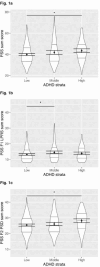Psychometric Properties of the Parental Stress Scale in Swedish Parents of Children with and without Neurodevelopmental Conditions
- PMID: 38645569
- PMCID: PMC11027036
- DOI: 10.2478/sjcapp-2024-0002
Psychometric Properties of the Parental Stress Scale in Swedish Parents of Children with and without Neurodevelopmental Conditions
Abstract
Background: Parents of children with neurodevelopmental conditions (NDC) are at risk of experiencing elevated levels of parental stress. Access to robust instruments to assess parental stress is important in both clinical and research contexts. Objective: We aimed to evaluate the psychometric properties of a Swedish version of the Parental Stress Scale (PSS), completed by parents of 3- to 17-year-old children, with and without NDCs.
Method: Main analyses were conducted on data from three independent samples: a community sample (n=1018), a treatment-seeking sample of parents of children with various disabilities (n=653), and a sample of parents of children with Attention-Deficit/Hyperactivity Disorder (ADHD) who themselves reported varying ADHD symptom severities (n=562). Additional analyses were enabled by the use of data from a complementary test-retest sample (n=337).
Results: The internal consistency of the PSS was good (Cronbach's alpha, α=.87) and its test-retest reliability moderate (ICC=.66). The scale correlated in the expected direction with related constructs (r=.50-.56 in the community sample). An exploratory factor analysis found its internal structure to reflect two aspects of parental stress: Lack of Parental Rewards and Role Satisfaction (factor 1, α=.90) and Parental Stressors and Distress (factor 2, α=.85). The treatment-seeking parents of children with disabilities reported higher parental stress than community reference parents (p<.001; Cohen's d=1.17). Moreover, we found that parents with high ADHD symptom severity reported higher parental stress than parents with low ADHD symptom severity (p<.001; d=0.39).
Conclusion: In summary, we found evidence in support of the reliability and validity of the PSS, which overall was judged to be useful as a measure of parental stress in a Swedish context. In addition, our results underline the importance of considering parental stress and related needs in assessments and intervention planning involving families of children with NDCs.
Keywords: Parental stress; assessment; caregiver burden; neurodevelopmental condition; parental ADHD.
© 2024 Therese Lindström et al., published by Sciendo.
Conflict of interest statement
Conflict of interest The authors declare no conflicts of interest related to this article. Although not related to this study, the authors do for transparency disclose that: Hirvikoski receives royalties for treatment manuals from Hogrefe and textbooks from Studentlitteratur. Bölte has in the last 3 years acted as an author, consultant, or lecturer for Medice, Roche, and LinusBio. Bölte receives royalties for textbooks and diagnostic tools from Hogrefe, UTB, Ernst Reinhardt, Kohlhammer, and Liber. Bölte is partner NeuroSupportSolutions International AB. Holmberg Bergman receives royalties for co-authorship of two popular science books from Natur & Kultur. Lindström receives royalties for co-authorship of a treatment manual from Hogrefe and this article is part of her doctoral project.
Figures

References
-
- Deater-Deckard K. Parenting stress. New Haven: Yale University Press; 2004.
-
- Bakker AB, Demerouti E. The Job Demands-Resources model: State of the art. J Manag Psychol. 2007;22(3):309–28.
-
- Karasek RA. Job demands, job decision latitude, and mental strain: implications for job redesign. Adm Sci Q. 1979;24:285–308.
-
- Lazarus RS, Folkman S. Stress, appraisal, and coping. New York: Springer; 1984.
-
- Siegrist J. Adverse health effects of high-effort/low-reward conditions. J Occup Health Psychol. 1996;1(1):27–41. - PubMed
LinkOut - more resources
Full Text Sources
